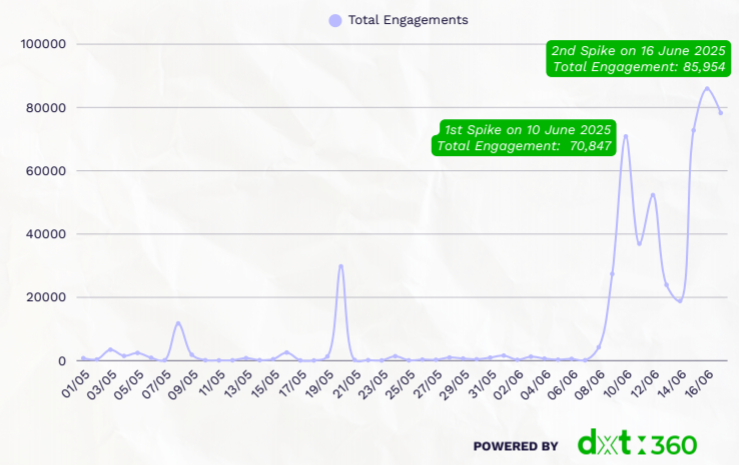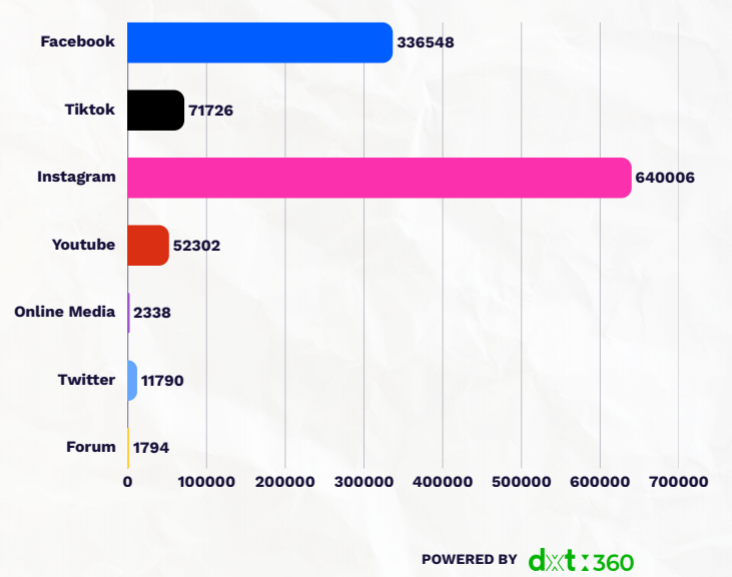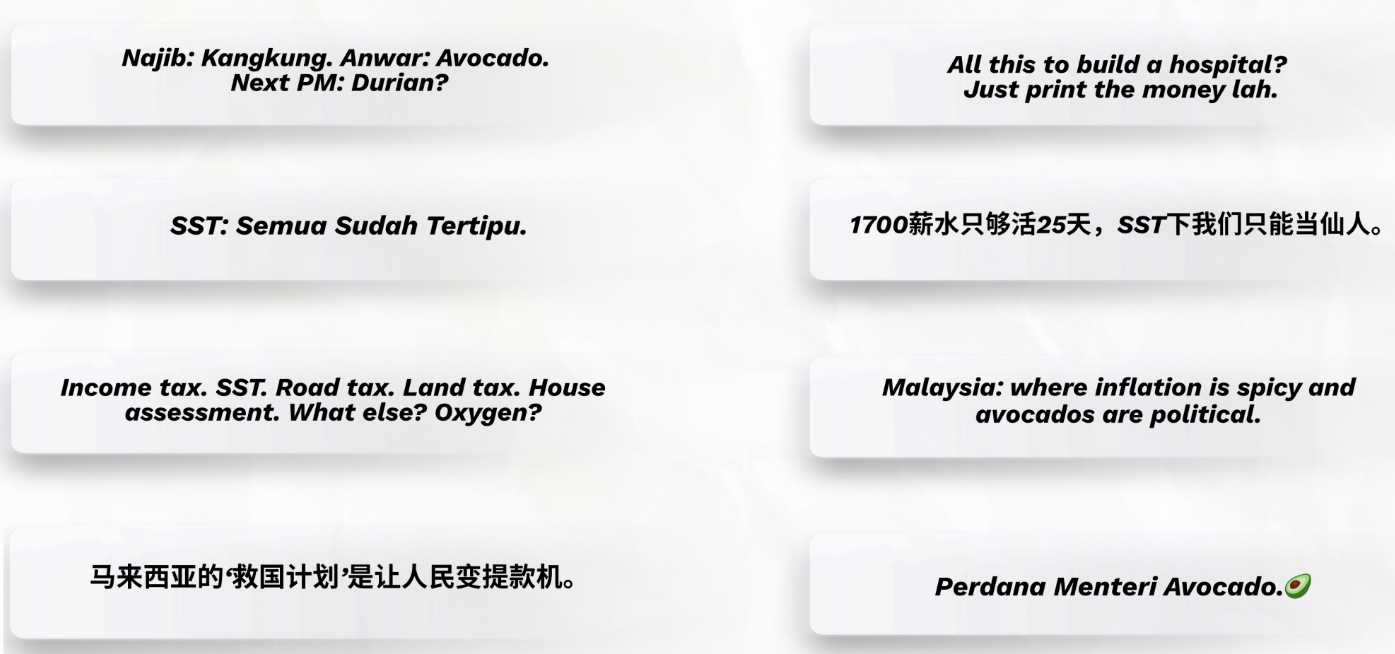THE AVOCADO UPROAR

 :How Imported Fruits Sparked A National Outcry
:How Imported Fruits Sparked A National Outcry
Malaysia’s recent Sales and Services Tax (SST) expansion triggered a widespread public reaction, capturing 180,058 mentions and generating over 540,504 engagements across social media platforms between 1 May and 17 June 2025.
What began as a policy update soon evolved into a full-blown national backlash. At the centre of the controversy was a viral remark about avocados, which became a lightning rod for public frustration. For many, it highlighted the growing disconnect between policymakers and the everyday realities of ordinary Malaysians, a perceived tone-deafness at the heart of the government’s messaging.
As online conversations intensified, the debate also reignited comparisons between the old GST and the current SST. Netizens questioned whether SST with its layered structure and perceived lack of transparency — was in fact more burdensome than the system it replaced. The expansion of SST has significant implications for Malaysia’s sales landscape, affecting both local and imported goods. The changes to SST also impact various points in the supply chain, from manufacturers to retailers, influencing costs and pricing throughout the market.
From debates on the Malaysia SST tax expansion to responses over the 2025 vape ban, our coverage captures the pulse of the nation. Visit our news section for more insights and articles.
 Timeline of Public Reactions
Timeline of Public Reactions

Public reaction to the SST expansion unfolded in stages, rising gradually in early May before exploding in mid-June due to a string of controversial announcements and poorly received public statements.
8 May 2025
Initial engagement spiked as word began circulating about SST applying to imported goods and services. Early concerns emerged around affordability and the burden this might place on small businesses and working-class consumers. There was also confusion about which goods and services would be exempted from the new tax imposed under the expanded SST framework.
9 June 2025
The Ministry of Finance officially announced that SST would be expanded effective 1 July. Under the revised framework, a 5–10% tax would now apply to a wider scope of goods and services, including imported items, construction, hairdressing, and private healthcare for non-citizens. The new SST applies different tax rates based on the nature of goods and specific services, with certain sectors facing higher rates depending on their classification. The announcement reignited a national conversation around taxation, trust, and policy planning.
10–12 June 2025
The debate intensified across platforms, with comparisons to GST gaining traction. Netizens began questioning whether the current government had abandoned GST for political convenience rather than economic logic. Concerns about transparency, tax layering, and cost-of-living pressure dominated the discourse. Many users expressed uncertainty about their tax liability under the new system and called for more accurate information from authorities to clarify their obligations.
15–16 June 2025
Prime Minister Anwar Ibrahim’s public defence of the new tax structure including the now-infamous statement that imported fruits like avocados would only affect the rich caused a massive backlash. The avocado comment went viral and became symbolic of government detachment from rakyat realities. It also led to memes, parodies, and a fresh wave of GST nostalgia.
17 June 2025
Multiple influential voices entered the conversation. Mydin’s Managing Director publicly refuted the avocado argument, while youth-led party MUDA and six national business groups urged the government to delay SST implementation. This amplified the narrative that the policy lacked economic compassion and strategic coordination.
 Where Did the Conversation Happen?
Where Did the Conversation Happen?
The conversation played out primarily across Facebook, TikTok, and Instagram, with meme culture, political commentary, and sarcastic takes dominating the narrative. TikTok, in particular, became a hub for short-form critique and humour, while Facebook hosted debates, personal stories, and calls for accountability.
 Key Topics That Drove the Conversation
Key Topics That Drove the Conversation
1. Madani Government Criticism & Mistrust (42%)
Many comments expressed strong dissatisfaction with the Madani administration and Prime Minister Anwar Ibrahim’s leadership. Citizens highlighted contradictions between past promises and current actions — particularly PH’s former stance against GST. The tone of the discussion ranged from disappointment to disillusionment, with increasing calls for greater transparency, accountability, and even a change in leadership. For these users, SST symbolised yet another betrayal of public trust.
2. SST vs GST Debate (20%)
Some comments reignited the GST debate, with many asking whether the new SST model offered any real improvement. GST, while once unpopular, was described as more structured, traceable, and equitable. Some users argued that the process of tax registration and service tax registration under SST was less transparent and more burdensome compared to GST. SST, in contrast, was seen as complex, layered, and indirectly passed on to consumers — especially in the form of increased service charges. These comparisons were not simply economic, but deeply political: many questioned whether the rejection of GST was ever about policy or purely about optics.
3. Cost-of-Living Pressure (18%)
Many comments focused on the growing financial strain experienced by everyday Malaysians. Users spoke about rising grocery bills, shrinking take-home pay, and the cumulative effect of SST on essential goods and services. Concerns were also raised about the impact of SST on employment income, with some fearing that increased costs would erode wages and make healthy living less affordable for ordinary Malaysians. The rhetoric revealed deep fatigue, especially among the B40 and M40 communities. The expansion of SST was seen not in isolation, but as part of a broader pattern of price hikes, fuel subsidy removals, and reduced financial assistance.
4. The Avocado Comment (10%)
Some comments turned a single quote into a nationwide punchline. What was meant as a justification for taxing imported goods — that “only the rich eat avocados” — became a viral moment of ridicule. Many Malaysians felt insulted by the assumption that healthy food was a luxury. The phrase was repeatedly used in memes and sarcastic videos, turning avocados into a symbol of tone-deaf policymaking. For many, this moment crystallised the perceived disconnect between government and rakyat.
5. Tax the Wealthy (10%)
A few comments argued that taxation efforts should target the ultra-rich, not average consumers. Netizens proposed alternative measures such as inheritance tax, luxury property tax, and windfall tax on conglomerates. There was also demand for better enforcement of existing corporate taxes. These voices did not oppose taxation per rather, they questioned why the burden fell disproportionately on those already struggling.
 Word Cloud Analysis: What Malaysians Were Really Talking About
Word Cloud Analysis: What Malaysians Were Really Talking About

This word cloud reflected the dominant narratives that shaped public opinion surrounding SST expansion. Frequently used terms revealed frustrations across four core themes:
1. Criticism Towards the Government & Implementation
Keywords like kerajaan (government), pelaksanaan (implementation), peluasan (expansion), and menaikkan (raising) captured anger over how the SST was introduced. The term besar (big) was used in multiple ways — as a jab at large traders expected to shoulder the cost, and as a sarcastic label for the government itself, accused of being “pencuri besar” (the biggest thief). Mentions of ph (Pakatan Harapan) appeared in conversations about broken promises, especially surrounding the abolishment of GST.
2. Class Tensions & Economic Inequality
Keywords like rakyat, b40, m40, golongan (group), ekonomi (economy), asas (essential), and kekayaan (wealth) revealed rising anger over how the SST burden affected different social classes. Many netizens felt that peniaga (traders), pekebun (farmers), and nelayan (fishermen) were hit hardest, while the wealthy remained protected. Small businesses expressed concern about the impact of SST registration requirements, particularly when their total sales exceed the threshold for mandatory compliance. Bantuan (financial aid like BR1M, PTPTN) was mentioned, but often with the caveat that these were insufficient and negated by rising costs.
3. Nostalgia for Stability & Leadership Comparisons
The keyword Najib emerged frequently, used by netizens nostalgic for perceived economic stability under the former prime minister. While GST was previously criticised, many now viewed it as a more functional and predictable system. Some comments speculated that the only reason SST replaced GST was because GST was politically associated with Najib’s administration.
4. Political Disillusionment & Voter Fatigue
Keywords like tunggu (wait) and tetap (still) embodied a sense of political exhaustion. Many felt that changing governments no longer produced meaningful change. There was a collective tone of resignation, with the rakyat expressing scepticism that any future leadership would prioritise their needs. This theme hinted at a broader democratic fatigue, with voters disengaging from reformist hopes.
 Social Sentiment Breakdown
Social Sentiment Breakdown
Sentiment analysis of public reactions to the SST expansion reflected a largely negative outlook, with 85% of comments expressing frustration, criticism, or disillusionment with the policy and its rollout. Many netizens condemned the Madani government’s handling of the revised tax structure, citing poor communication, broken promises, and a growing disconnect from the daily struggles of ordinary Malaysians. Some business owners shared their frustrations about the complexity of having to file SST returns and the delays in receiving an approval letter after registration. The viral “avocado” remark, in particular, became a focal point for ridicule and scepticism, symbolising a lack of sensitivity to public sentiment. For many, SST came to represent not just a tax measure, but a broader failure of leadership and empathy.
10% of comments were neutral in tone, comprising factual observations about rates, scope, and implementation. These reflected a need for clearer guidelines, policy consistency, and transparent justification for the shift from GST to SST.
The remaining 5% of comments conveyed a positive sentiment, with some netizens acknowledging that taxation is a necessary part of nation-building. However, even among supporters, there were calls for fairer structures, improved policy design, and better messaging to avoid alienating the public.
 What Netizens Were Saying
What Netizens Were Saying

From witty sarcasm to genuine frustration, the SST conversation revealed the many ways Malaysians made sense of a policy they felt was unfairly implemented. Many comments reflected confusion about which specific services provided were subject to SST and how the total value of those services would affect business obligations.
 Final Takeaways
Final Takeaways
 Public Sentiments Shapes Momentum
Public Sentiments Shapes Momentum
From avocado memes to #SST2025 threads, social media did more than reflect sentiment — it reshaped it. The platform didn’t just carry the message; it rewrote it.
 Policy Without Empathy Is Policy That Backfires
Policy Without Empathy Is Policy That Backfires
When economics meet lived experience, tone matters. And in this case, one fruit made it loud and clear: Malaysians expect better.










